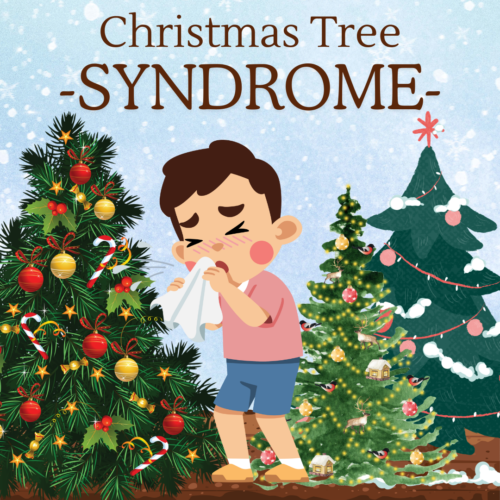A Guide to a Less Itchy Future Christmas: Christmas Tree Syndrome

Although the holidays and festive occasions have passed, the joyous environment may still be on our minds. Often we may remember the fun times, but forget the inconveniences this time brings. If you’ve noticed itchy or sore eyes, or even coughing and sneezing during that time, you’re not alone. You’ve probably been hit with Christmas Tree Syndrome. This unique syndrome spikes up around that time of year. It typically refers to allergy-like symptoms that are caused by Christmas trees.According to the American Christmas Tree Association, a study was conducted in 2011 by SUNY Upstate Medical University studying which concluded there were over 50 different types of mold in a Christmas tree sample. The variety of molds found on Christmas trees can include Aspergillus, Penicillium, Cladosporium, and Alternaria, among others. Though the effects can vary person to person, generally the mold can cause a stuffy nose, wheezing, and itchy, red eyes, or skin. Pollen and dust found on Christmas trees can have similar effects, specifically to people who have these allergies. Additionally, in an article from Ohio State University, Kara Wada discussed how the sap inside the trees, also known as colophony or rosin can cause rashes similar to ones caused by poison ivy.
There are many simple actions you can take to avoid spreading this sickness, one of them being cleaning the tree before it enters the house. Shaking the tree for any loose dirt or debris, or even hosing down the Christmas tree greatly decreases the chances of mold, dust, and even sap being found in the tree. Depending on your specific circumstance it could be more convenient to consider buying an artificial tree rather than a real Christmas tree. These trees can be less problematic, though can accumulate dust and mold spores. To avoid this it would be best to clean off the tree before putting it into storage so when it’s ready to open up for the upcoming year there isn’t any unwanted buildup. It’s also important to keep the tree in a clean container and dry area to avoid any mold growth. Maintaining good indoor air quality is also crucial during the holiday season. Besides cleaning the tree, regularly changing air filters or using dehumidifiers can help reduce overall allergen levels in your house.
For people who suffer from this syndrome, the holidays may be more of an inconvenience than a joyous occasion. These simple, preventive actions can help you enjoy a healthier and more comfortable holiday season in the future.
Anika is a current writer for The Talon. She enjoys writing, along with watching Netflix and listening to music.






